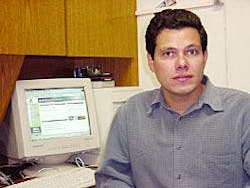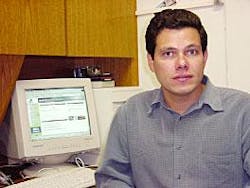The fallout from Argentina's fiscal woes has staggered the oil and gas industry there, as it has other sectors.
That has provided a new window of opportunity for South America's most dynamic new petroleum sector player, Brazil's Petroleo Brasileiro SA (Petrobras).
The fiscal crunch in Brazil's neighbor to the south has spurred Petrobras to shop for assets suddenly devalued as a result of Argentina's fiscal collapse.
Petrobras recently announced plans to acquire a controlling interest in Perez Companc SA, South America's largest independent oil and gas company, for $1.18 billion (OGJ Online, July 29, 2002).
That followed shortly Petrobras's announcement that it is considering acquiring Petrolera Santa Fe, the Argentine subsidiary of Oklahoma City-based Devon Energy Corp. (OGJ Online, June 17, 2002).
And now the Brazilian giant says it wants to purchase the Argentine assets of Repsol-YPF SA-but at a discounted cost that Petrobras claims it is contractually entitled to because of losses, stemming from the devaluation of the Argentine peso, that were incurred in an asset swap between the two firms.
Meanwhile, the Argentine government lifted recently imposed strictures regarding oil exports and diesel sales taxes that domestic petroleum firms had complained were worsening their plight. That change has already bolstered those companies' near-term earnings outlooks.
Repsol-YPF assets eyed
Petrobras Pres. Francisco Gros said in Madrid recently that the Brazilian company wants to purchase, at a discount, Repsol-YPF's Argentine assets as compensation for the devaluation of Argentina's peso, which caused financial losses for Petrobras as a result of the $1 billion asset swap between the two companies that took place last year (OGJ Online, Jan. 2, 2001).
This contract includes provisions for exchange devaluation both in Brazil or Argentina and, for this reason, Gros declared that "as it stands, we should be receiving some form of compensation from Repsol-YPF." Although Gros stated that so far no negotiations have started between the two companies, he said that he will meet with Alfonso Cortina, president of Repsol-YPF.
Repsol SA, the former state oil company of Spain, acquired YPF SA, the privatized state oil company of Argentina, in mid-1999 (OGJ, July 19, 1999, Newsletter).
Repsol-YPF profits dropped by 58% in 2001, after the company allocated 2.74 billion euros ($2.7 billion) from its reserves and profits to cover potential losses caused by the 72% devaluation of the peso against the US dollar registered this year.
Petrobras officials confirmed that Gros's statements referred to Repsol-YPF's assets in Argentina but declined to give further details. Gros was in Madrid to announce the start of trading of Petrobras shares on the Madrid stock exchange Latibex, which comprises Latin American company stocks quoted in euros.
"To have shares traded in Europe, in euros, helps to expand the number of Petrobras shareholders and is part of our internationalization policy," said Joao Nogueira Batista, Petrobras finance director.
Argentina's woes
"To no one's surprise, the collapse of the Argentine economy had a serious impact on that country's energy industry. The exchange devaluation had an immediate effect on the dollar contracts held in the energy sector, making it difficult for many firms to honor their financial obligations abroad," Prof. Edmar Luiz F. de Almeida, head of the energy group in the Institute of Economics at Rio de Janeiro's Federal University, told OGJ.
He added, "The sharp rise in inflation has forced Argentina's government to slow down deregulation in the (energy) sector. For example, it is maintaining price controls, making it even more difficult for firms to pay their debts.
"Petroleum and petroleum products firms can in theory turn to the world market if domestic prices are too low. As a result, domestic prices for petroleum and oil products tend to follow international prices. But the recent jump in inflation and the steep drop in public revenues led Argentina's government to adopt strategies to push domestic oil prices below international levels."
Argentina's government earlier this year placed taxes of 5% and 20% on exports of oil and oil products, respectively. Beyond this, the government is closely monitoring the level of oil products exports, threatening to impose more restrictions on them if it feels domestic supplies are running short. These restrictions represent an attempt to control the domestic price of liquid fuels, Almeida noted.
"Past experiences demonstrated that attempts to control the prices of oil products and infrastructure services have only short-term effects on inflation. In the medium and long run, such policies only reduce investments in the sector," he said.
Petrobras's Argentina strategy
Almeida said he is not surprised that Petrobras wants to purchase assets in Argentina for two reasons: With the depreciation of the peso, assets in that country have lost considerable value; and buying assets in Argentina is part and parcel of Petrobras's strategy to become a major regional player in South America.
Through its international arm (Braspetro) Petrobras has activities throughout the world, and the company's officials reiterate that they want Petrobras to expand internationally. "Despite this, Petrobras's real priority is South America," Almeida said.
In Argentina, Petrobras has committed a further $140 million to boost its presence in that country during 2002-05, said Gros.
To date, Petrobras has invested $1.09 billion in Argentina, of which $593.1 million was spent in 2000 and $500 million-matched by Repsol-YPF-went to the asset swap.
Petrobras will invest a total of $86 million in Argentina in 2002, including $43 million to upgrade the Bahia Blanca refinery and $8 million to build a 3.5 km pipeline at the refinery. Bahia Blanca's existing processing capacity is 31,200 b/d, and there is an adjacent asphalt production plant.
A further $1 million will be spent at the company's lubricants plant at Bahia Blanca, to debottleneck capacity to produce 2,500 cu m/month of lubricants, vs. current production of 1,200-1,500 cu m/month. The plant began producing Petrobras's own brand of Lubrax lubricants in January.
And Petrobras will spend $20 million to overhaul its Eg3 network of 640 service stations, located across Argentina, with a primary focus on Buenos Aires Province. Eg3 has an 11% share of the distribution market.
Petrobras also will spend $14 million on exploration in the Neuquen basin, where it owns interests in four blocks: Puesto Zuniga, Cerro Manrique, Puesto Gonzales, and Mata Mora.
According to Braspetro, Petrobras's proven reserves in Argentina totaled 7.1 million bbl of oil and 293 million cu m of natural gas at the end of 2001. Petrobras production comes from its 15% stake in the Aguarague joint venture, which owns nine natural gas fields in Salta Province. Other partners include Argentina's Tecpetrol SA and Repsol-YPF.
Petrobras's net output from Aguarague was earlier projected at 10,000 boe/d, but average production in 2001 was 4,800 boe/d.
Restrictions suspended
The Argentine government suspended a temporary limit on oil exports (36% of production) and lowered its export tax on diesel to 5% from 20%. The restrictions had come into effect on June 3.
Analysts cited the changes as positive for Argentine company earnings.
"Both new measures are positive for Perez Companc and are reflected in our estimates, as we had expected the temporary restrictions to be lifted for the fourth quarter of the year," said analysts at Salomon Smith Barney Inc. "In our view, the lifting of export restrictions enhances (Perez Companc's) ability to obtain US dollar revenue, and the lower export tax on diesel represents improved export margins for the fourth quarter and therafter."
For the analysts, this and the reduction of the tax on diesel exports were temporary measures implemented in order to combat domestic shortages of diesel.
The reduction of export tax for diesel, while marginal, should also be positive, as it represents improved exports margins for Perez Companc. Diesel export volumes represented 2% of the firm's total sales in the first quarter.
The lifting of export limitations will increase Perez Companc's ability to sell abroad and to obtain international and US dollar revenue, the Salomon analysts said.
"With the restriction in place for the third quarter, we anticipated a reduction in exports to 36% of Argentine production from the 58% reported for the first quarter. However, for the fourth quarter, our estimates reflect an increase to 45%, as we had anticipated the restriction would be lifted for the quarter," they added.
Risks
"We believe the most immediate risk to Perez (Companc) is the uncertainty of the regulatory framework for the oil industry in Argentina," Salomon said.
Recent market volatility and the current short-term macroeconomic shocks in Latin America have caused actual share prices to be much more unstable than market fundamentals might suggest in a calmer environment and can be the cause of large variations in these respective prices, the analyst said.
"We are expecting the market will adjust and return to a calmer state in the near termellipse" Salomon concluded.
Repsol-YPF
Repsol-YPF released a statement welcoming the lifting of oil export restrictions.
The giant Spanish-Argentine oil company reported for the first half of 2002 net income of 302 million euros, showing a year-on-year rise of 4.6% against first half 2001. This was accompanied by a drastic reduction in company debt, which as of June 30 was 8.96 billion euros, in comparison with 20.406 billion euros a year ago.
This results were especially significant considering the adverse international scenario and the situation in Argentina, the statement said.
Oil prices, despite a rise towards the end of the period, were much lower than in the first half 2001, and international refining margins were at their lowest in 10 years.


